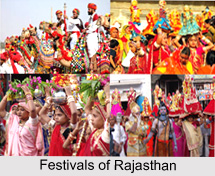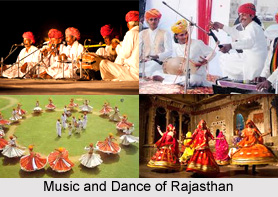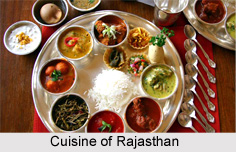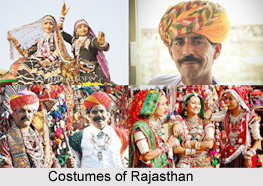
Culture of Rajasthan declares the western Indian colourful culture, folk songs and the dances with balance.
Rajasthani culture is enriched in heritage and ethnicity, encompassing the whole of Indian cultural scenario. The royal dynasties, which had ruled over the region, patronized varied art forms. To add to these, the folk communities contributed to the Rajathani culture with its treasure of equally rich folk cultural exuberance. Music depicts the simple and mundane chores of the Rajasthanis, coupled by high standardization of Indian classics.
Festivals of Rajasthan
Festivals embellish the richness of Rajasthani culture, making the lives of Rajasthanis so full of colour and festivity. The pious Rajasthanis celebrate in great enthusiasm all the main festivals of India like Diwali, Holi, and Janmasthami. Desert festivals are exclusive to Rajasthani culture and the people fete in gusto. Every year it is observed during the chilly seasons of winter. The fair too is organized with its own fun and frolic. Snake charmers, puppeteers, acrobats and artists enthral the tourists and the Rajasthani folks, glorifying the awe and beauty of the desert region. Camels are also a special attraction of the festival. In fact the festival plate certain wonderful game tricks perform by the camels that are part and parcel of Rajasthanis. Unique hard work is done in attiring the animal and prepares them to participate in the extravagant competition for judging the camel apparels. Other interesting competitions are the moustache and turban tying competitions and the people wholeheartedly enjoys these festivities. The Rajasthani damsels fete Gangaur, the eighteen-day long festival, in honor of Goddess Parvati, to seek husbands of their choice. In the month of August, a majestic fair is held at Gogamedi, in Rajasthan in August in memory of a folk god Gogaji.
Every year it is observed during the chilly seasons of winter. The fair too is organized with its own fun and frolic. Snake charmers, puppeteers, acrobats and artists enthral the tourists and the Rajasthani folks, glorifying the awe and beauty of the desert region. Camels are also a special attraction of the festival. In fact the festival plate certain wonderful game tricks perform by the camels that are part and parcel of Rajasthanis. Unique hard work is done in attiring the animal and prepares them to participate in the extravagant competition for judging the camel apparels. Other interesting competitions are the moustache and turban tying competitions and the people wholeheartedly enjoys these festivities. The Rajasthani damsels fete Gangaur, the eighteen-day long festival, in honor of Goddess Parvati, to seek husbands of their choice. In the month of August, a majestic fair is held at Gogamedi, in Rajasthan in August in memory of a folk god Gogaji.
 Music and Dance of Rajasthan
Music and Dance of Rajasthan
Any study of Indian culture will be incomplete without taking some glimpse of its music and dance. Rajasthani culture, too, is quite opulent in this matter. Musical melodies of the folk culture are perfectly reflected by its tradition of dance and songs. Folk songs are usually ballads, which relate grand deeds of heroes and love tales. Religious and spiritual songs, namely, bhajans, and banis are also prevalent. They are usually performed in various joyful occasions in accompaniment of instruments like sarangi, dholak, sitar, etc. The Bhopa communities of Rajasthan sung narrative songs and strike the strings of `Ravan -hatta` music instrument. Rajasthani culture has accumulated the prestige of worldly fame for its unique dance forms, namely, Kalbeliya dance of Jaisalmer and Ghoomar dance from Udaipur. Ghoomar is a customary female Rajasthani folk dance, participated by women dancers in whirling drapes, and accompanied by male and females singers.
Panihari Singing Style
Panihari is a unique singing style promulgated by Rajasthani females, fetching water from the wells. Women sung song while fetching water from wells. Dance too is a medley of both traditional and `desi` gharanas. Rajasthani culture is a land of colorful festivals. The cuisine nicely incorporates the tradition of Rajasthanis, making less use of water and consumes both vegetables and non- vegetarian meals. The land of Thar Desert provides unique charm to the people and the lifestyle of Rajasthanis justifies the simplicity and elegance of the region.
 Cuisine of Rajasthan
Cuisine of Rajasthan
Rajasthan is a land of warriors and desert dwellers and this has largely been resembled in Rajasthani culture. Cuisine, too, is oriented to this trend. Dal, bati and churma are the staple food. . Lachhedar paratha and besan ki missi puri are kinds of bread specialties of Rajasthan. Rajasthans had likings for non- vegetarian dished prepared from mutton. `Safed` mass (white meat) is prepared adding almonds, cashew nuts. Spices like coriander, mint are used rampantly in cooking. Chutneys also add more flavours to the sumptuous Rajasthani meals.
Lifestyle of Rajasthan
The desert region of Rajasthan has its unique aura to cast spell not only to the localities as well as to the whole world. Lifestyle, naturally, is curbed out under this influence and thus creates a huge impact on the whole of Rajasthani culture. Apart from the serenity of Thar, exotic range of Aravallis and the historical legacy of Rajputs and Mughal kings as found in the remnants of their monuments, palaces and forts drew attention of lots of tourists, even from abroad. The majestic palaces have turned into Heritage Hotels with provision of providing comforts and luxury. Rajasthan is a treasure house of mines and textiles with high population of local tribes like Jats, Bhils, and Gujars. Their beautiful handicrafts and artworks are acclaimed highly by the nation. Rajasthani culture remains stand apart in uniqueness in its cultural exuberance. Music, festivals, cuisine and lifestyle are the gems that the whole nation feels proud of.






